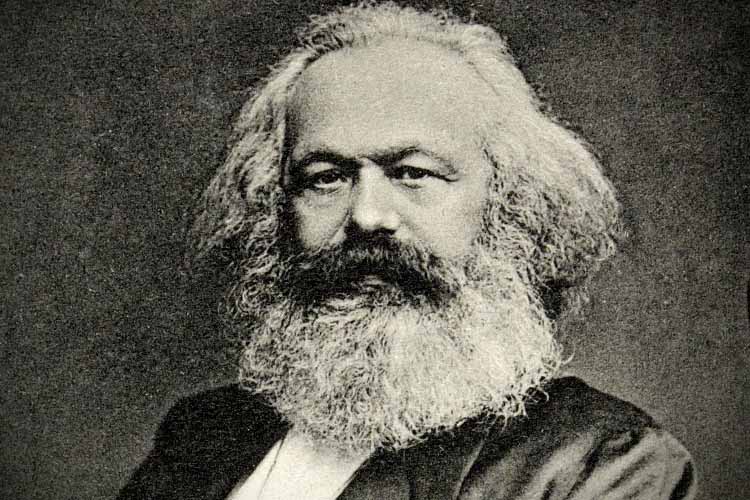By Karl Marx
Published in New-York Daily Tribune on June 25, 1853
Retrieved from Marxist Internet Archive
Telegraphic dispatches from Vienna announce that the pacific solution of the Turkish, Sardinian and Swiss questions, is regarded there as a certainty.
Last night the debate on India was continued in the House of Commons, in the usual dull manner. Mr. Blackett charged the statements of Sir Charles Wood and Sir J. Hogg with bearing the stamp of optimist falsehood. A lot of Ministerial and Directorial advocates rebuked the charge as well as they could, and the inevitable Mr. Hume summed up by calling on Ministers to withdraw their bill. Debate adjourned.
Hindostan is an Italy of Asiatic dimensions, the Himalayas for the Alps, the Plains of Bengal for the Plains of Lombardy, the Deccan for the Apennines, and the Isle of Ceylon for the Island of Sicily. The same rich variety in the products of the soil, and the same dismemberment in the political configuration. Just as Italy has, from time to time, been compressed by the conqueror’s sword into different national masses, so do we find Hindostan, when not under the pressure of the Mohammedan, or the Mogul [1], or the Briton, dissolved into as many independent and conflicting States as it numbered towns, or even villages. Yet, in a social point of view, Hindostan is not the Italy, but the Ireland of the East. And this strange combination of Italy and of Ireland, of a world of voluptuousness and of a world of woes, is anticipated in the ancient traditions of the religion of Hindostan. That religion is at once a religion of sensualist exuberance, and a religion of self-torturing asceticism; a religion of the Lingam and of the juggernaut; the religion of the Monk, and of the Bayadere. [2]
I share not the opinion of those who believe in a golden age of Hindostan, without recurring, however, like Sir Charles Wood, for the confirmation of my view, to the authority of Khuli-Khan. But take, for example, the times of Aurangzeb; or the epoch, when the Mogul appeared in the North, and the Portuguese in the South; or the age of Mohammedan invasion, and of the Heptarchy in Southern India; [3] or, if you will, go still more back to antiquity, take the mythological chronology of the Brahman himself, who places the commencement of Indian misery in an epoch even more remote than the Christian creation of the world.
There cannot, however, remain any doubt but that the misery inflicted by the British on Hindostan is of an essentially different and infinitely more intensive kind than all Hindostan had to suffer before. I do not allude to European despotism, planted upon Asiatic despotism, by the British East India Company, forming a more monstrous combination than any of the divine monsters startling us in the Temple of Salsette. [4] This is no distinctive feature of British Colonial rule, but only an imitation of the Dutch, and so much so that in order to characterise the working of the British East India Company, it is sufficient to literally repeat what Sir Stamford Raffles, the English Governor of Java, said of the old Dutch East India Company:
“The Dutch Company, actuated solely by the spirit of gain, and viewing their [Javan] subjects, with less regard or consideration than a West India planter formerly viewed a gang upon his estate, because the latter had paid the purchase money of human property, which the other had not, employed all the existing machinery of despotism to squeeze from the people their utmost mite of contribution, the last dregs of their labor, and thus aggravated the evils of a capricious and semi-barbarous Government, by working it with all the practised ingenuity of politicians, and all the monopolizing selfishness of traders.”
All the civil wars, invasions, revolutions, conquests, famines, strangely complex, rapid, and destructive as the successive action in Hindostan may appear, did not go deeper than its surface. England has broken down the entire framework of Indian society, without any symptoms of reconstitution yet appearing. This loss of his old world, with no gain of a new one, imparts a particular kind of melancholy to the present misery of the Hindoo, and separates Hindostan, ruled by Britain, from all its ancient traditions, and from the whole of its past history.
There have been in Asia, generally, from immemorial times, but three departments of Government; that of Finance, or the plunder of the interior; that of War, or the plunder of the exterior; and, finally, the department of Public Works. Climate and territorial conditions, especially the vast tracts of desert, extending from the Sahara, through Arabia, Persia, India, and Tartary, to the most elevated Asiatic highlands, constituted artificial irrigation by canals and water-works the basis of Oriental agriculture. As in Egypt and India, inundations are used for fertilizing the soil in Mesopotamia, Persia, &c.; advantage is taken of a high level for feeding irrigative canals. This prime necessity of an economical and common use of water, which, in the Occident, drove private enterprise to voluntary association, as in Flanders and Italy, necessitated, in the Orient where civilization was too low and the territorial extent too vast to call into life voluntary association, the interference of the centralizing power of Government. Hence an economical function devolved upon all Asiatic Governments, the function of providing public works. This artificial fertilization of the soil, dependent on a Central Government, and immediately decaying with the neglect of irrigation and drainage, explains the otherwise strange fact that we now find whole territories barren and desert that were once brilliantly cultivated, as Palmyra, Petra, the ruins in Yemen, and large provinces of Egypt, Persia, and Hindostan; it also explains how a single war of devastation has been able to depopulate a country for centuries, and to strip it of all its civilization.
Now, the British in East India accepted from their predecessors the department of finance and of war, but they have neglected entirely that of public works. Hence the deterioration of an agriculture which is not capable of being conducted on the British principle of free competition, of laissez-faire and laissez-aller. But in Asiatic empires we are quite accustomed to see agriculture deteriorating under one government and reviving again under some other government. There the harvests correspond to good or bad government, as they change in Europe with good or bad seasons. Thus the oppression and neglect of agriculture, bad as it is, could not be looked upon as the final blow dealt to Indian society by the British intruder, had it not been attended by a circumstance of quite different importance, a novelty in the annals of the whole Asiatic world. However changing the political aspect of India’s past must appear, its social condition has remained unaltered since its remotest antiquity, until the first decennium of the 19th century. The hand-loom and the spinning-wheel, producing their regular myriads of spinners and weavers, were the pivots of the structure of that society. From immemorial times, Europe received the admirable textures of Indian labor, sending in return for them her precious metals, and furnishing thereby his material to the goldsmith, that indispensable member of Indian society, whose love of finery is so great that even the lowest class, those who go about nearly naked, have commonly a pair of golden ear-rings and a gold ornament of some kind hung round their necks. Rings on the fingers and toes have also been common. Women as well as children frequently wore massive bracelets and anklets of gold or silver, and statuettes of divinities in gold and silver were met with in the households. It was the British intruder who broke up the Indian hand-loom and destroyed the spinning-wheel. England began with driving the Indian cottons from the European market; it then introduced twist into Hindostan, and in the end inundated the very mother country of cotton with cottons. From 1818 to 1836 the export of twist from Great Britain to India rose in the proportion of 1 to 5,200. In 1824 the export of British muslins to India hardly amounted to 1,000,000 yards, while in 1837 it surpassed 64,000,000 of yards. But at the same time the population of Dacca decreased from 150,000 inhabitants to 20,000. This decline of Indian towns celebrated for their fabrics was by no means the worst consequence. British steam and science uprooted, over the whole surface of Hindostan, the union between agriculture and manufacturing industry.
These two circumstances – the Hindoo, on the one hand, leaving, like all Oriental peoples, to the Central Government the care of the great public works, the prime condition of his agriculture and commerce, dispersed, on the other hand, over the surface of the country, and agglomerated in small centers by the domestic union of agricultural and manufacturing pursuits – these two circumstances had brought about, since the remotest times, a social system of particular features – the so-called village system, which gave to each of these small unions their independent organization and distinct life. The peculiar character of this system may be judged from the following description, contained in an old official report of the British House of Commons on Indian affairs:
“A village, geographically considered, is a tract of country comprising some hundred or thousand acres of arable and waste lands; politically viewed it resembles a corporation or township. Its proper establishment of officers and servants consists of the following descriptions: The potail, or head inhabitant, who has generally the superintendence of the affairs of the village, settles the disputes of the inhabitants attends to the police, and performs the duty of collecting the revenue within his village, a duty which his personal influence and minute acquaintance with the situation and concerns of the people render him the best qualified for this charge. The kurnum keeps the accounts of cultivation, and registers everything connected with it. The tallier and the totie, the duty of the former of which consists […] in gaining information of crimes and offenses, and in escorting and protecting persons travelling from one village to another; the province of the latter appearing to be more immediately confined to the village, consisting, among other duties, in guarding the crops and assisting in measuring them. The boundary-man, who preserves the limits of the village, or gives evidence respecting them in cases of dispute. The Superintendent of Tanks and Watercourses distributes the water […] for the purposes of agriculture. The Brahmin, who performs the village worship. The schoolmaster, who is seen teaching the children in a village to read and write in the sand. The calendar-brahmin, or astrologer, etc. These officers and servants generally constitute the establishment of a village; but in some parts of the country it is of less extent, some of the duties and functions above described being united in the same person; in others it exceeds the above-named number of individuals. […] Under this simple form of municipal government, the inhabitants of the country have lived from time immemorial. The boundaries of the villages have been but seldom altered; and though the villages themselves have been sometimes injured, and even desolated by war, famine or disease, the same name, the same limits, the same interests, and even the same families have continued for ages. The inhabitants gave themselves no trouble about the breaking up and divisions of kingdoms; while the village remains entire, they care not to what power it is transferred, or to what sovereign it devolves; its internal economy remains unchanged. The potail is still the head inhabitant, and still acts as the petty judge or magistrate, and collector or renter of the village.”
These small stereotype forms of social organism have been to the greater part dissolved, and are disappearing, not so much through the brutal interference of the British tax-gatherer and the British soldier, as to the working of English steam and English free trade. Those family-communities were based on domestic industry, in that peculiar combination of hand-weaving, hands-spinning and hand-tilling agriculture which gave them self-supporting power. English interference having placed the spinner in Lancashire and the weaver in Bengal, or sweeping away both Hindoo spinner and weaver, dissolved these small semi-barbarian, semi-civilized communities, by blowing up their economical basis, and thus produced the greatest, and to speak the truth, the only social revolution ever heard of in Asia.
Now, sickening as it must be to human feeling to witness those myriads of industrious patriarchal and inoffensive social organizations disorganized and dissolved into their units, thrown into a sea of woes, and their individual members losing at the same time their ancient form of civilization, and their hereditary means of subsistence, we must not forget that these idyllic village-communities, inoffensive though they may appear, had always been the solid foundation of Oriental despotism, that they restrained the human mind within the smallest possible compass, making it the unresisting tool of superstition, enslaving it beneath traditional rules, depriving it of all grandeur and historical energies. We must not forget the barbarian egotism which, concentrating on some miserable patch of land, had quietly witnessed the ruin of empires, the perpetration of unspeakable cruelties, the massacre of the population of large towns, with no other consideration bestowed upon them than on natural events, itself the helpless prey of any aggressor who deigned to notice it at all. We must not forget that this undignified, stagnatory, and vegetative life, that this passive sort of existence evoked on the other part, in contradistinction, wild, aimless, unbounded forces of destruction and rendered murder itself a religious rite in Hindostan. We must not forget that these little communities were contaminated by distinctions of caste and by slavery, that they subjugated man to external circumstances instead of elevating man the sovereign of circumstances, that they transformed a self-developing social state into never changing natural destiny, and thus brought about a brutalizing worship of nature, exhibiting its degradation in the fact that man, the sovereign of nature, fell down on his knees in adoration of Kanuman, the monkey, and Sabbala, the cow.
England, it is true, in causing a social revolution in Hindostan, was actuated only by the vilest interests, and was stupid in her manner of enforcing them. But that is not the question. The question is, can mankind fulfil its destiny without a fundamental revolution in the social state of Asia? If not, whatever may have been the crimes of England she was the unconscious tool of history in bringing about that revolution.
Then, whatever bitterness the spectacle of the crumbling of an ancient world may have for our personal feelings, we have the right, in point of history, to exclaim with Goethe:
“Sollte these Qual uns quälen
Da sie unsre Lust vermehrt,
Hat nicht myriaden Seelen
Timur’s Herrschaft aufgezehrt?”
[“Should this torture then torment us
Since it brings us greater pleasure?
Were not through the rule of Timur
Souls devoured without measure?”]
[From Goethe’s “An Suleika”, Westöstlicher Diwan]
Notes
[1] A reference to the rule in India, mainly in the north, of the Mohammedan invaders who came from Central Asia, Afghanistan and Persia. Early in the thirteenth century the Delhi Sultanate became the bulwark of Moslem domination but at the end of the fourteenth century it declined and was subsequently conquered by the Moguls, new invaders of Turkish descent, who came to India from the east of Central Asia in the early sixteenth century and in 1526 founded the Empire of the Great Moguls (named after the ruling dynasty of the Empire) in Northern India. Contemporaries regarded them as the direct descendants of the Mongol warriors of Genghis Khan’s time, hence the name “Moguls”. In the mid-seventeenth century the Mogul Empire included the greater part of India and part of Afghanistan. Later on, however, the Empire began to decline due to peasant rebellions, the growing resistance of the Indian people to the Mohammedan conquerors and increasing separatist tendencies. In the early half of the eighteenth century the Empire of the Great Moguls practically ceased to exist.
[2] Religion of the Lingam – the cult of the God Shiva, particularly widespread among the southern Indian sect of the Lingayat (from the word “linga” – the emblem of Shiva), a Hindu sect which does not recognise distinctions of caste and rejects fasts, sacrifices and pilgrimages.
Juggernaut (Jagannath) – a title of Krishna, the eighth avatar of Vishnu. The cult of juggernaut was marked by sumptuous ritual and extreme religious fanaticism which manifested itself in the self-torture and suicide of believers. On feast days some believers threw themselves under the wheels of the chariot bearing the idol of Vishnu-juggernaut.
[3] Heptarchy (government by seven rulers) – a term used by English historiographers to describe the political system in England from the sixth to eighth centuries, when the country was divided into seven highly unstable Anglo-Saxon kingdoms, which, in their turn, frequently split up and reunited. Marx uses this term by analogy to describe the disunity of the Deccan (Central and South India) before its conquest by the Mohammedans at the beginning of the fourteenth century.
[4] The island of Salsette, north of Bombay, was famous for its 109 Buddhist cave temples.






